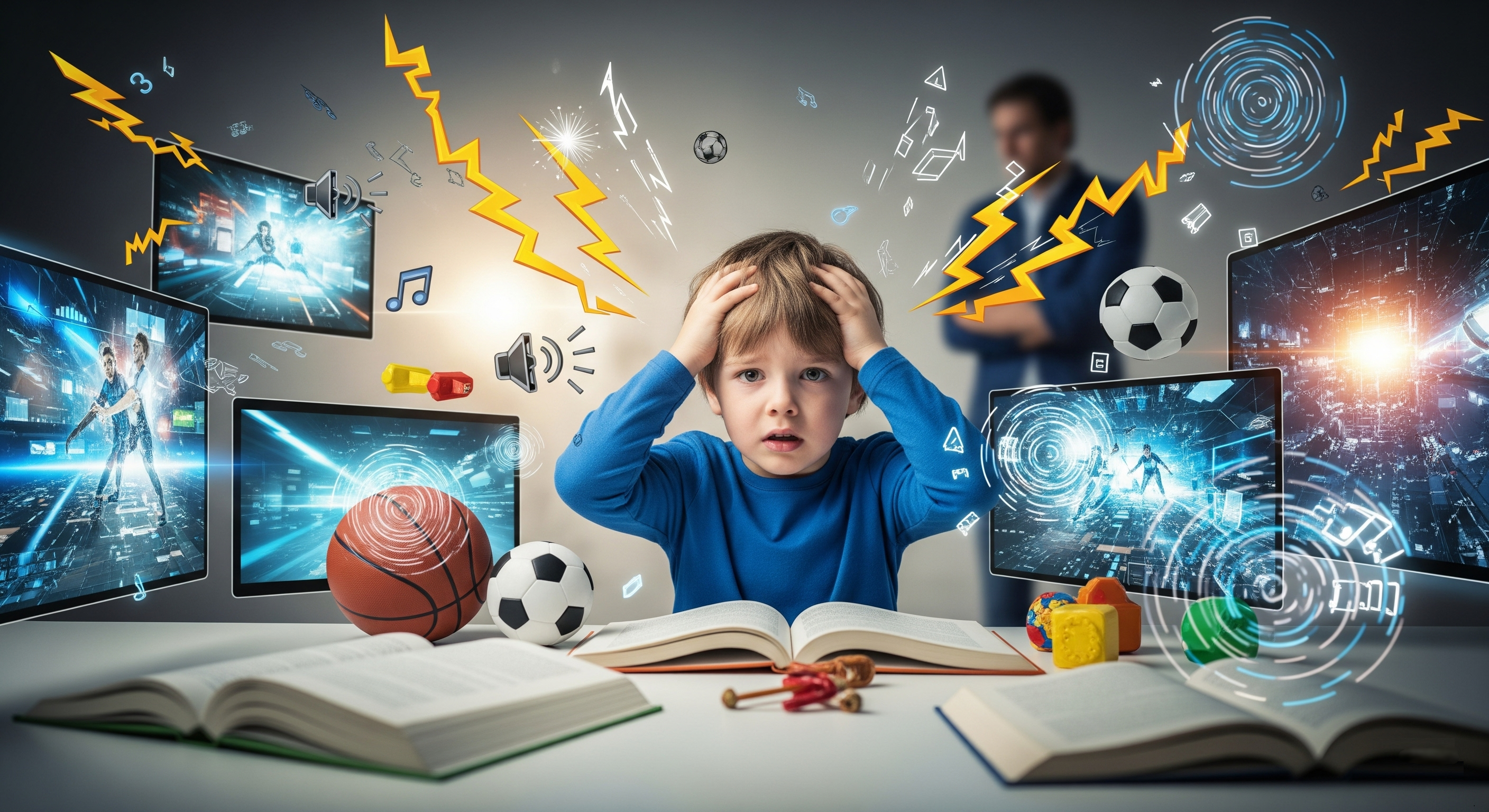Modern children, even the youngest ones, live in a world full of stimuli. Colorful toys, loud sounds, screens, advertisements, and the fast pace of everyday life—all of this means their nervous systems are constantly stimulated. In preschool, where children interact with peers, face new tasks, and experience a range of emotions, overstimulation can be especially noticeable. It is important to understand how an excess of stimuli and stress affect the mental health of the youngest children and what role adults—both parents and teachers—play in this process.
The Child’s Nervous System and Stress: What Happens in the Body?
A child’s nervous system is extremely plastic, but also very sensitive. In the first years of life, the brain develops intensively, creating millions of new neural connections. This is when basic emotional, social, and cognitive skills are formed. However, an excess of stimuli can disrupt this process.
A key role is played by the autonomic nervous system, which consists of two parts:
The sympathetic nervous system—responsible for mobilizing the body in stressful situations (“fight or flight”).
The parasympathetic nervous system—responsible for calming, regeneration, and returning to balance.
Ideally, these two systems work alternately, allowing the child to be active and to rest. However, in situations of chronic stress and overstimulation, the sympathetic system remains active for too long. The child becomes irritable, has trouble concentrating, sleeping, and even forming relationships with peers. Research shows that chronic stress in childhood can lead to lasting changes in the structure and function of the brain, increasing the risk of emotional and cognitive disorders in adulthood.

Overstimulation in Preschool—How to Recognize It?
Preschool is a place where children learn cooperation, independence, and how to deal with emotions. However, an excess of stimuli can cause even the calmest child to start displaying difficult behaviors. How can you recognize that a child is overstimulated?
Typical signs of overstimulation in preschoolers:
Sudden outbursts of anger or crying without a clear reason
Trouble falling asleep or frequent waking at night
Excessive activity or, conversely, withdrawal and apathy
Problems with concentration during play or activities
Complaints of stomachaches, headaches, or lack of appetite
It’s important to remember that every child is different—some are more sensitive to stimuli, others cope better with noise or changes. However, if symptoms persist for a longer time, it’s worth taking a closer look at the child’s daily environment. Often, even a small change, such as reducing noise at home or introducing calmer activities after preschool, can bring noticeable improvement in the child’s behavior.
Where Does Overstimulation Come From? The Main Sources
1. Screens and Digital Media
Even very young children have contact with tablets, smartphones, or television. Dynamic images, rapid scene changes, and loud sounds—all of this strongly stimulates the nervous system. Studies show that excessive exposure to screens can lead to speech delays, difficulty concentrating, and problems with emotional regulation. For example, if a child is particularly irritable after preschool and has trouble calming down before bed, it’s worth checking whether they are spending too much time in front of a screen. Often, simply limiting evening cartoons and engaging in calm, shared play helps the child settle down more quickly.
2. Noise and Intense Auditory Stimuli
Preschool is a place full of sounds—laughter, conversations, music, toys that make noises. If this is combined with noise from the street or television at home, the child may feel overwhelmed. Chronic noise makes it difficult to rest and can lead to learning problems and difficulties with emotional self-regulation. In practice, if you notice that your child is more irritable after returning from noisy places, it’s worth providing a quiet space for relaxation, such as reading books together in a cozy corner at home.
3. Lack of Contact with Nature and Animals
Children who spend most of their time indoors are more prone to stress and overstimulation. Contact with nature has a soothing effect on the nervous system, lowers cortisol levels, and promotes calmness. Similarly, contact with animals—petting a dog or cat helps children relax and improves their mood. Even a short walk in the park after preschool can help a child calm down and fall asleep more easily.
4. Too Many Activities and No Time for Boredom
Many parents enroll their children in numerous extracurricular activities, wanting to give them the best possible start. However, an overly packed schedule can lead to overload and a lack of time for free play, which is crucial for developing creativity and self-regulation skills. If a child attends additional activities every day after preschool and is tired and irritable in the evening, it’s worth considering introducing one “free” afternoon for unstructured play at home.

Long-Term Effects of Overstimulation
Overstimulation in preschool age can have serious consequences in the future. Children who are exposed to excessive stimuli and stress for a long time may experience:
Attention and hyperactivity disorders—difficulty focusing, impulsivity, learning problems.
Anxiety and depression—chronic stress increases susceptibility to anxiety, low mood, and even depression later in life.
Chronic fatigue and sleep problems—difficulty falling asleep, frequent waking, lack of energy during the day.
Difficulties in relationships with peers—irritability, withdrawal, trouble making friends.
It is worth observing your child and responding to the first signs of overload, rather than waiting for the difficulties to escalate.
Parental Stress and Children’s Stress—An Inseparable Bond
Children do not live in a vacuum—their well-being and stress levels are closely linked to the emotions of adults, especially parents. Research shows that even the youngest children “read” the emotions of their caregivers and unconsciously absorb their tension. If a parent is stressed, rushed, often raises their voice, or shows frustration, the child begins to feel similar emotions, even if they do not understand the cause.
In practice, this means that working on your own mental well-being as a parent is one of the most important elements of preventing overstimulation in your child. A calm, composed adult gives the child a sense of security and teaches them how to deal with difficult emotions. For example, if after a stressful day a parent finds a moment for calm, shared play or conversation with the child, the child will calm down more quickly and feel safer.

How to Prevent Overstimulation in Preschoolers? Practical Tips
1. Limit Screen Time
Set clear rules for using electronic devices.
Choose calm, educational content.
Ensure “digital silence” before bedtime—at least an hour without screens.
2. Create a Calm Environment
Avoid excessive noise at home and in preschool.
Limit the number of toys and visual stimuli in the room.
Provide a place for the child to relax—a corner with pillows, a tent, a soft rug.
3. Spend Time Outdoors
Daily walks, play in the park, contact with nature.
Organize trips to the forest, botanical garden, or countryside.
If possible, allow the child to interact with animals.
4. Allow the Child to Be Bored
Don’t plan every minute of the day—free play is essential for development.
Give the child time to invent their own games, build with blocks, draw.
5. Take Care of Your Own Calm and Balance
Practice relaxation techniques—deep breathing, meditation, yoga.
Talk to your child about emotions—name them, show how to deal with them.
Seek support from other parents, teachers, or specialists if needed.
6. Cooperation Between Preschool and Parents
Organize meetings and workshops on coping with stress.
Agree together on rules for using digital media.
Share observations about children’s behavior—quick response helps prevent more serious problems.
Summary
Overstimulation and stress are challenges faced by most preschoolers and their families today. Excessive stimuli, the fast pace of life, and social pressure can negatively affect a child’s emotional and cognitive development. The key to maintaining balance is consciously managing the amount of stimuli, ensuring contact with nature, introducing calming rituals, and taking care of your own emotional well-being. Remember, children learn from us—if we learn to cope with stress, they will be able to do so as well.

References
Christakis, D. A. (2019). The role of media in child development. JAMA Pediatrics, 173(3), 219-220.
Gunnar, M. R., & Quevedo, K. (2007). The neurobiology of stress and development. Annual Review of Psychology, 58, 145-173.
Li, D., & Sullivan, W. C. (2016). Impact of views to school landscapes on recovery from stress and mental fatigue. Landscape and Urban Planning, 148, 149-158.
Stansfeld, S. A., & Clark, C. (2015). Health effects of noise exposure in children. Current Environmental Health Reports, 2(2), 171-178.
Waters, S. F., West, T. V., Karnilowicz, H. R., & Mendes, W. B. (2014). Affect contagion between mothers and children: Examining valence and arousal. Journal of Experimental Psychology: General, 143(1), 1-13.
Gray, P. (2011). The decline of play and the rise of psychopathology in children and adolescents. American Journal of Play, 3(4), 443-463.

